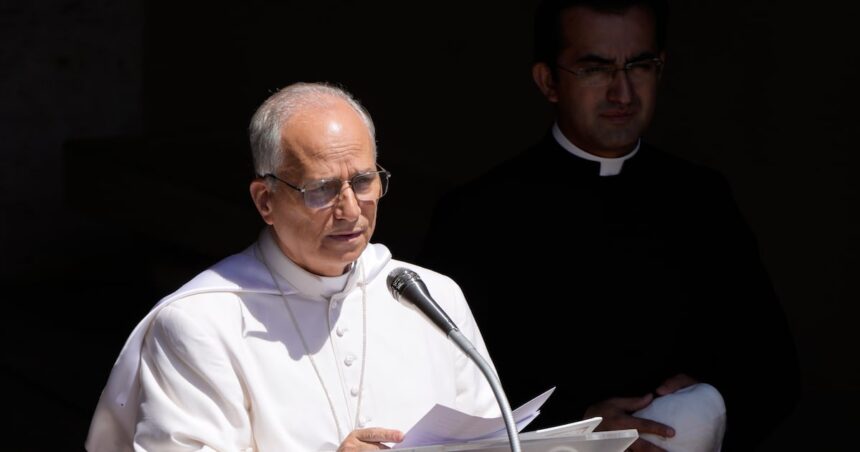The Vatican’s diplomatic rhetoric has shifted dramatically following an Israeli strike on the Holy Family parish in Gaza City, marking a significant evolution in Pope Francis’s approach to the Israel-Hamas conflict. What began as calls for peace has transformed into explicit condemnation of Israeli military actions in Gaza.
“Words of peace aren’t enough anymore,” a Vatican diplomatic source told me in Brussels last week. “When sacred spaces become military targets, the Holy See cannot remain measured in its response.”
Saturday’s attack on the Catholic parish compound, which reportedly killed two Christian women and injured seven others, triggered an unusually direct Vatican statement condemning “the killing of defenseless civilians.” Cardinal Pietro Parolin, the Vatican’s Secretary of State, called the incident “a horrifying act that occurred in a place where only defenseless civilians seeking shelter and assistance were present.”
The Holy See’s diplomatic language has grown progressively sharper since October 7th. According to Emiliano Bos, a Vatican affairs analyst I spoke with, “The Pope initially balanced his statements carefully, condemning both Hamas’s terror attack and expressing concern for Palestinian civilians. But as civilian casualties mounted, his messaging began emphasizing the disproportionate suffering in Gaza.”
This progression reflects a complex calculation. The Vatican maintains diplomatic relations with both Israel and Palestine, walking a tightrope that has become increasingly difficult as the conflict intensifies. The Holy See recognized the State of Palestine in 2015, a move that sparked tension with Israeli authorities.
“The Church has historical obligations to Christians in the Holy Land that date back centuries,” explained Sister Marie Cohen, who coordinates Catholic relief efforts in Jerusalem. “When those communities come under direct threat, silence isn’t an option.”
Indeed, the Gaza parish compound had been sheltering approximately 600 civilians—Christians and Muslims—when the strike occurred. The Latin Patriarchate of Jerusalem claims Israeli forces hit the convent of the Sisters of Mother Teresa deliberately, destroying their generator and fuel supplies.
The Israeli military disputed this characterization, stating they targeted a Hamas command center, with IDF spokesperson Daniel Hagari claiming, “We did not strike the church. We struck a terrorist compound adjacent to the church.”
Such contradicting narratives have become common in this conflict, but the Vatican’s willingness to directly challenge Israel’s account represents a notable shift. Previous conflicts saw more diplomatic ambiguity from the Holy See.
Vatican officials point to a pattern of attacks on religious institutions in Gaza. In October, a Greek Orthodox church was hit during an Israeli airstrike that killed 18 people. These incidents have contributed to the increasingly forceful stance from Pope Francis, who recently described what’s happening in Gaza as “terrorism.”
For Palestinian Christians, this evolving Vatican position carries profound significance. “When the Pope speaks with clarity about our suffering, it reminds the world we exist,” Rami Khouri, a Palestinian Christian academic told me. “Christians have been in Gaza since the earliest days of the faith—we’re not just collateral damage in someone else’s conflict.”
The Catholic Church maintains significant humanitarian operations throughout the region. Caritas Internationalis, the Vatican’s humanitarian arm, reports critical shortages of medical supplies, food, and clean water in their Gaza facilities. According to United Nations data, approximately 1,000 Christians lived in Gaza before the conflict began on October 7, representing a tiny minority in the territory of 2.3 million people.
Israeli government reactions to the Vatican’s hardening stance have been measured but defensive. An Israeli foreign ministry official, speaking on condition of anonymity, told me, “We value our relationship with the Holy See, but we expect a deeper understanding of our security imperatives when facing an enemy that uses civilian infrastructure for military purposes.”
This diplomatic tension occurs against a backdrop of deteriorating humanitarian conditions. The World Health Organization reports Gaza’s health system has effectively collapsed, with only 13 of 36 hospitals partially functioning amid severe shortages of anesthetics, antibiotics, and basic medical supplies.
For Pope Francis, who has made interreligious dialogue and protection of vulnerable populations central themes of his papacy, the Gaza conflict presents a profound challenge. His increasingly direct language appears driven by both moral imperatives and practical concerns about the Christian presence in the Holy Land.
“The Pope understands that Christendom’s most ancient communities face existential threats throughout the Middle East,” Vatican analyst Thomas Reese explained. “His condemnations aren’t just about this conflict, but about preserving Christian witness in its birthplace.”
As Christmas approaches—traditionally a time when the Vatican’s attention focuses intensely on Bethlehem and Jerusalem—observers expect Pope Francis to continue amplifying his calls for immediate ceasefire and humanitarian access. Whether this hardening tone will influence Israeli military operations remains uncertain, but it clearly signals that the world’s smallest state has found its voice in a conflict with global implications.






